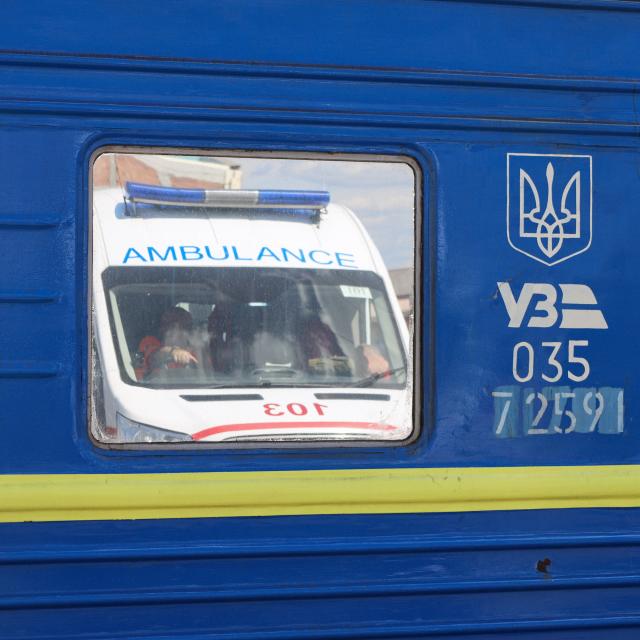
Since March, a train operated by the Ukrainian Railways, in partnership with MSF – Doctors Without Borders and the Ukrainian Government, transports patients from the battlegrounds of Ukraine’s East towards Western Ukraine for treatment. The Lëtzebuerger Journal went to see the situation from the ground.
A cargo train yard in Western Ukraine. The August mid-day sun mercilessly burns down on the gravel and concrete of the old cargo terminal. The air is filled by the harmony of blunt noises from train clutches hammering against each other and cargo wagons achingly going over old tracks. Out of nowhere, a dozen ambulances start turning up onto the cargo platform, with the gravel crunching gently under the tires. The ambulances are from Berlin, Poland, from the Ukrainian Emergency Services and they all wait on the platform for "the train" and their patients. It’s a demonstration of international solidarity, in the midst of a war that has shown no mercy for civilians.
As the ambulances park on the cargo platforms, their crews disembark too. They are mostly young volunteers, tattooed sleeves, shades against the sun, and with an eager look on their faces, determined to help. They put their jobs on hold as doctors, anesthetic nurses, medevac drivers and firefighters to help in Ukraine. Even if the ambulances look the same, like the ones at home, nearly each one of them has a rack inside with bullet-proof vests and ballistic helmets. The aggressor does not differentiate. The train with it’s signature blue wagons and it’s mirrored window glass, arrives only 10 minutes late, gently screeching when entering the terminal, having completed yet another 24-hour trip from Ukraine’s East to the Western part of the country, a small miracle but a railway worker just smiles and says: "We try to keep trains running on time here".
Doctor Albina and her patients
One of the doctors who relentlessly fights for the lives of the patients on board is Doctor Albina. She is an Ukrainian internal medicine specialist and emergency surgeon. Like the bulk of all doctors that work for MSF, she is voluntarily assisting MSF in their mission. "Next to the victims of war we also transport people with complicated diabetes mellitus, or massive cardiac events, arteriosclerosis or complicated cancer cases", she explains while showing Lëtzebuerger Journal the different wagons and different treatment possibilities the train offers. When the war started, she was working in a hospital and saw first hand the effects of the war on the civilian population. MSF is active in Ukraine since 1999. On March 25, a month after Russia’s invasion, MSF decided to reevaluate their presence in Ukraine and to massively scale up their operations. Together with the Ministry of Health in Kyiv and the Ukrainian Railways, they invented a system of medical referral trains. When the first train went to pick up patients, Dr Albina was one of the first doctors to volunteer and join MSF.
You want more? Get access now.
-
One-year subscription€185.00/year
-
Monthly subscription€18.50/month
-
Zukunftsabo for subscribers under the age of 26€120.00/year
Already have an account?
Log in


